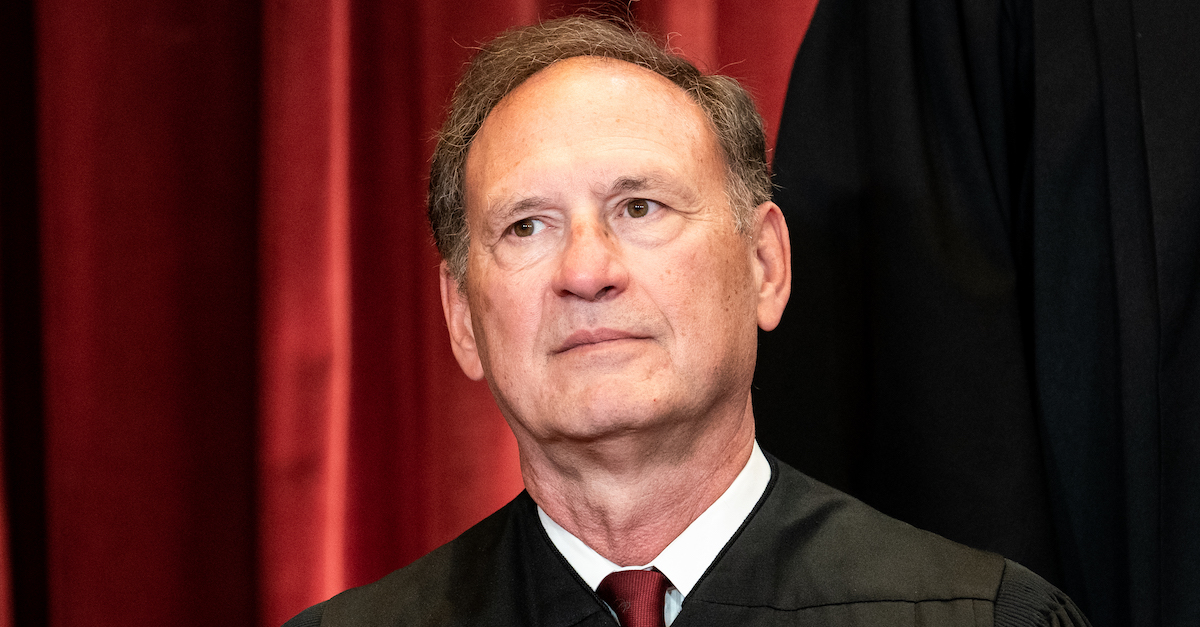
Associate Justice Samuel Alito sits during a group photo of the Justices at the Supreme Court in Washington, DC on April 23, 2021.
The Supreme Court justice who wrote a draft opinion that would overturn Roe v. Wade and rollback abortion access nationwide says that the financial burden of having a child is alleviated by the very government program he would have ended.
A Politico report late Monday revealed what appears to be a draft Supreme Court opinion written by Justice Samuel Alito in the case of Dobbs v. Jackson Women’s Health Organization.
That case challenges the constitutionality of a Mississippi law that prohibits all abortions after 15 weeks of pregnancy—a direct contradiction to the right to abortion guaranteed by the 1973 decision in Roe as well as the Supreme Court ruling in Planned Parenthood v. Casey in 1992.
As Law&Crime noted, Alito clearly states the purpose of the 68-page opinion.
“We hold that Roe and Casey must be overruled,” the opinion says. “The Constitution makes no reference to abortion, and no such right is implicitly protected by any constitutional provision, including the one on which the defenders of Roe and Casey now chiefly rely—the Due Process Clause of the Fourteenth Amendment. That provision has been held to guarantee some rights that are not mentioned in the Constitution, but any such right must be ‘deeply rooted in this Nation’s history and tradition’ and ‘implicit in the concept of ordered liberty.’ The right to abortion docs not fall within this category.”
The opinion goes on to say that the reasoning in Roe was “exceptionally weak” and the decision “has had damaging consequences.”
“And far from bringing about a national settlement of the abortion issue, Roe and Casey have enflamed debate and deepened division,” the opinion says.
The draft refers to arguments from both supporters and opponents of abortion rights.
“Defenders of Roe and Casey do not claim that any new scientific learning calls for a different answer to he underlying moral question [of abortion], but they do contend that changes in society require the recognition of a constitutional right to obtain an abortion,” the opinion says. “Without the availability of abortion, they maintain, people will be inhibited from exercising their freedom to choose the types of relationships they desire, and women will be unable to compete with men in the workplace and in other endeavors.”
The draft then points to “countervailing arguments about modern day developments” from the anti-abortion side, noting that “attitudes about the pregnancy of unmarried women have changed drastically” and that anti-discrimination laws and workplace guarantees of leave for pregnancy and childbirth “in many cases” indicate that giving birth wouldn’t have an impact on a woman’s job.
The opinion then cites the Affordable Care Act, otherwise known as Obamacare—the very government program that Alito himself has argued is unconstitutional.
“[T]he costs of medical care associated with pregnancy are covered by insurance of government assistance,” the opinion says. That point refers to a footnote, specifically Footnote 44, that expands further:
The Affordable Care Act requires non-grandfathered health plans in the individual and small group markets to cover certain essential health benefits, which includes maternity and newborn care. The ACA also prohibits annual limits, and limits annual cost-sharing obligations on such benefits. State Medicaid plans must provide coverage for pregnancy-related services—including, but not limited to, prenatal care, delivery, and postpartum care—as well as services for other conditions that might complicate the pregnancy. State Medicaid plans are also prohibited from imposing deductions, cost-sharing, or similar charges for pregnancy-related services for pregnant women [citations omitted].
This footnote cites the ACA as a benefit to pregnant women, but Alito has previously said that the ACA is unconstitutional. In 2012, Alito joined the dissent in National Federation of Independent Business v. Sebelius, the Supreme Court decision that initially upheld then-President Barack Obama’s wide-ranging health care law.
Similarly, Alito dissented in 2015 in King v. Burwell and in 2021 in California v. Texas, both of which upheld the ACA.
Describing the 2021 ruling as latest chapter in “our epic Affordable Care Act trilogy,” Alito reiterated his conclusion that the ACA is unconstitutional.
Its benefits, however, appear to be enough to support the decision to pull back what has for decades considered to be the constitutionally-protected right to an abortion.
Chief Justice John Roberts confirmed Tuesday morning that the document was real. Roberts called for an investigation.
[Image via U.S. Supreme Court.]